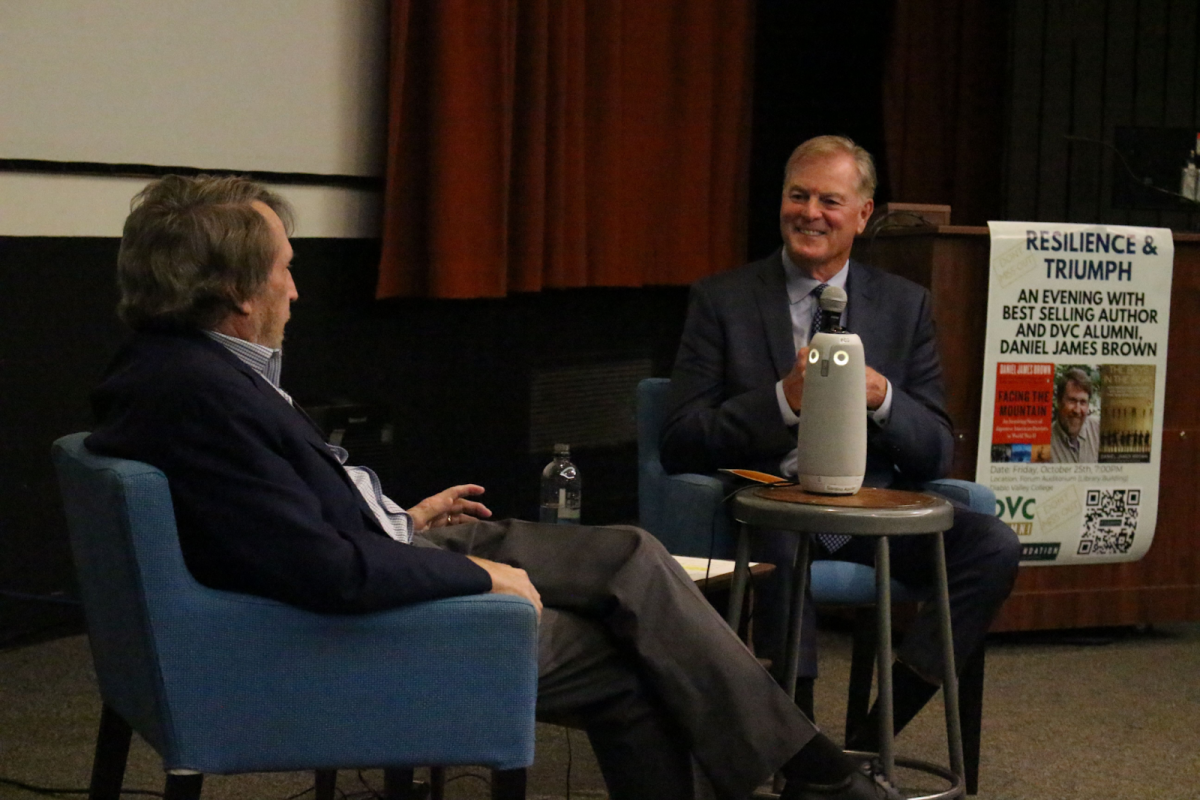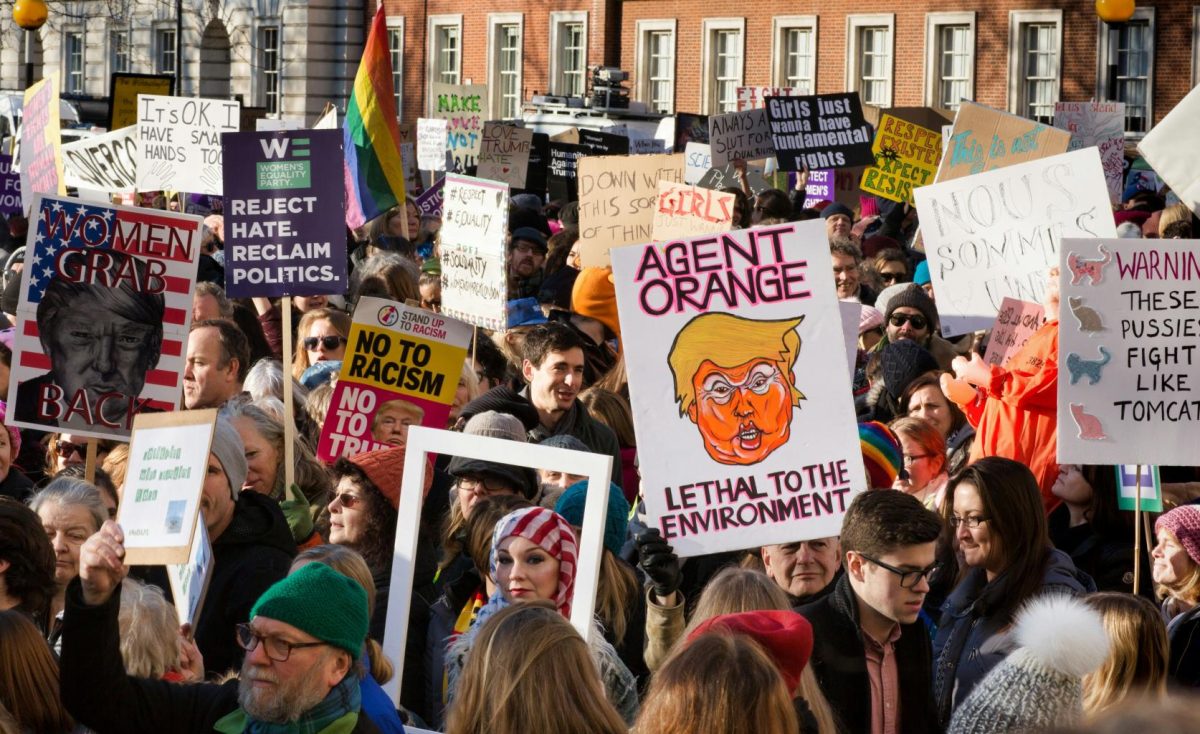Following the November election that declared the presidential victory of Donald Trump over Vice President Kamala Harris, the DVC Social Justice program organized a panel discussion and Q&A session on Nov. 14 to address students’ concerns and queries regarding the election results.
A panel of five professors and a local immigration attorney shared their interpretation of the election results and how to move forward. The first two speakers discussed politics and media literacy while the remaining four emphasized the importance of community and resilience in the wake of the election.
The moderator, political science professor Dr. Albert Ponce, described the event as an opportunity to “analyze the ways that race, class divisions, gender, patriarchy, mis-/disinformation and critical media literacy are in dire need in the age of Trumpism.”
Before turning the microphone over to the panelists, Ponce reaffirmed the program’s fight against censorship and called for the immediate reinstatement of Asad Kabir, a Contra Costa College philosophy professor who has been suspended for sending district-wide emails expressing solidarity with Palestine.
“We stand with him and others who are arbitrarily targeted specifically for speaking and teaching about injustice the world over,” said Ponce, who co-directs the Social Justice program. “Threats to our own academic freedom to do what we do here will intensify. “We know that. We’re ready.”
Ponce’s comments about the constraints on academic freedom and human rights reverberated in the remarks of the first speaker, Mickey Huff.
Huff, a history professor who helped revitalize and previously chaired the DVC Journalism Department, presented an analysis from the intersection of political science, education, and media analysis.
“The reason that this [election result] isn’t terribly surprising to those of us who really pay close attention to the intersections of media corporatism and politics is because for the last 50 years we’ve had a corporate culture that has captured the public commons: education [and] the Fourth Estate,” said Huff, who also directs Project Censored, a self-described media watchdog and critical media literacy organization.
Overtaken by the “professional managerial class,” Huff said the higher education system is “more concerned about numbers and metrics than what we’re actually teaching or learning.”
To remedy this, he proposed that academic institutions integrate social justice with history and offer critical media literacy, which teaches individuals to analyze bias, disinformation and corporate ownership of the press.
Taking a critical lens to the media, Huff analyzed how the press fueled political polarization in the lead-up to the election. He noted that shadow banning, social media curation algorithms and partisan bias in mainstream media have intensified ideological divisions.
“[The corporate media] pits people into different camps of Team Red and Team Blue that attack each other and talk past each other,” he said. “This hyperpartisanship and fragmented media landscape is not serving the public interest.”
Huff said the Harris campaign failed to rally enough progressive voters, because her platform upheld a similar center-right agenda as the Biden administration and catered more to conservatives than to progressives, especially regarding foreign policy and the border.
“The criticism of the campaign that somehow they were too woke is laughable,” he said. “They were campaigning with former war criminals.”
Huff also noted inconsistencies in the Harris campaign, pointing out that she reversed her position on inflation and border policy. He also asserted that Harris lost the support of key voting demographics when she circumvented the genocide in Palestine and underestimated the economic concerns of the working class.
Huff cautioned the audience on Project 2025, the agenda formed by conservative think tank Heritage Foundation and associated with the Trump administration.
“[Trump] is in the process of already nominating many people that have been associated with those very draconian and right-leaning policies that go against the public interest,” Huff said.
“But this also mirrors some of the problems with the campaign we just got out of with the Democrats,” he added, noting their neoconservative coalition and their decision to forgo a presidential primary upon Biden’s withdrawal from the election race.
Moving forward, Huff stressed the importance of independent news outlets, critical media literacy and social justice education. Huff also encouraged the audience to engage in constructive dialogue with people across the political spectrum.
“I know that it seems sometimes impossible in our society, especially in another contentious election year,” Huff said. “But I think that the alternative – of either ignoring these types of issues or trying to attack them or going into denial – I don’t think any of those things are actually useful. In fact, they end up causing more long-term harm.”
As a nation, Huff said, “We need to really get serious about corporate capture of our institutions. We need to get serious about having news media in the public interest. And we need to get serious about human rights for all.”
“This is not a time to mourn; it’s a time to organize.”

These sentiments were shared and expanded upon by the following speaker, Nolan Higdon, a professor of media literacy and journalism at DVC and University of California, Santa Cruz.
Like Huff, Higdon said he found the election results upsetting but not surprising.
In order to learn from the election, Higdon supported the assessment of blame, but made it clear that this didn’t equate to singling out or scapegoating particular voting demographics. Instead, he said, “We need to talk about the real people who have power in this country. That’s who needs to take the blame.”
Higdon criticized the capitalist elitism of the Democratic Party and said the public has consistently rejected its neoliberal agenda in favor of the populist campaigns of Barack Obama in 2008, Bernie Sanders in 2015, and Donald Trump in 2015.
But when Trump won the 2016 presidential race after campaigning as the populist icon of the Republican Party, the Democrats attacked and blamed the political left for their loss.
Estranged from their party, Democratic populist voters joined the Republican Party. Rather than learn from its mistakes, Higdon said, the Democratic Party continued its non-revolutionary, neoliberal policies of the Biden administration, once again driving voters to the Republican ranks.
“I am skeptical, to say the least, that Trump will deliver on these goals that he promises for working people,” Higdon said. “But what does concern me is there is a dearth of organization amongst the left. If you looked at that electoral map, all I saw was, this is what happens when you have a left that’s individualized, that’s market-driven, that’s focused on career or getting their credentials.”
He called for fellow college and university instructors to question the neoliberal ideals that are embedded into higher education institutions.
“I think the very fact that so many of us normalized our administration censoring political messages on email is a prime example of that,” Higdon said.
“That very same administrator will send out messages about Black Lives Matter and Ukraine, but, all of a sudden, when someone sent out messages about the Palestinians, it was like, ‘We need to shut this shit down. This is official school business. Please stop sending that email,’” Higdon said. “That’s the exact type of hypocrisy that runs in neoliberal spaces such as this.”
Beyond academic neoliberalism and censorship, Higdon called out the media coverage of the presidential candidates, noting that while liberal news sites rightfully discussed Trump’s problematic qualities, (including racist rhetoric, sexist behavior and dozens of felony charges) they concealed Harris’ shortcomings with enthusiastic coverage of her exuberance, humor, and “good vibes.”
Higdon also discussed how the Harris campaign also bungled their voter outreach and mobilization efforts among podcast listeners.
“That’s where the audiences are at. Donald Trump was reaching those audiences. Harris is not the podcast-type politician,” Higdon said, adding that the Harris campaign avoided leftist podcasts that criticized Democratic policies and rhetoric.
Higdon also argued that the Democratic Party was racist and sexist in its own way by spotlighting Vice President Harris only as a political icon for women of color. Then, after throwing her into a presidential race with only 100 days to make up the 400 electoral votes which Biden was predicted to have lost, Democratic strategists considered nominating only white men for a better chance to win future elections.
“There’s nothing more racist and sexist than that,” Higdon said.
During the Q&A session that followed the panel discussion, one student expressed discontent with the two-party system and asked if anything could be done to change it.
Higdon responded, “[Two party politics is] not turning out every four years and electing someone and then going back home. That means every single day, 24 hours a day, you need to try and find a person in power that you can agitate and annoy, to get to do what you want.”
“It’s like finding someone to marry,” he joked. “You need to keep annoying them constantly to get them to the position you want.”
But he made it clear that a political relationship should not be in any way obsequious.
“That means don’t have an ‘I’m with her’ bumper sticker or wear your dorky Maga hat,” Higdon said. “These [politicians] are people you need to put pressure on. These are people who’re supposed to be representative, so don’t treat them like celebrities and friends – treat them like targets. And that’s what they are.”
Higdon’s parting advice was to use this election as an opportunity to question the neoliberal status quo of the Democratic Party.
“Don’t let a good crisis go to waste,” Higdon said. “I’ve never seen liberals in my life be this self-reflective on the Democratic Party, and I promise you the consultants will explain it away if we don’t act fast. So act now, stick a middle finger in their face and tell them you want something different.”











































































